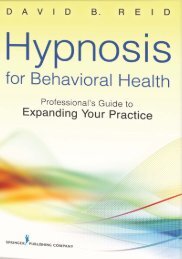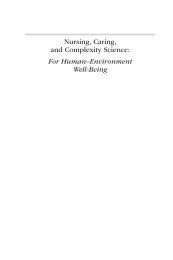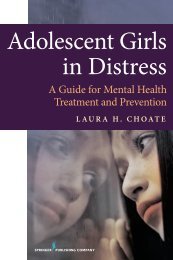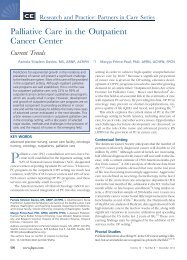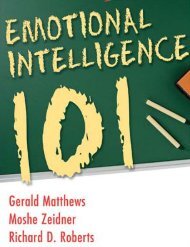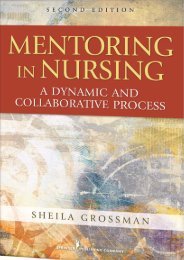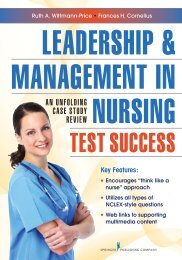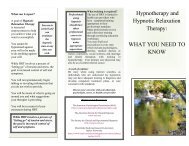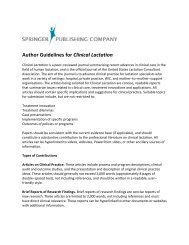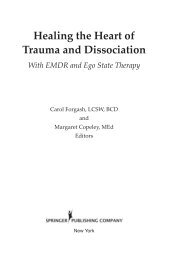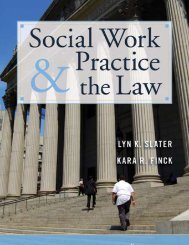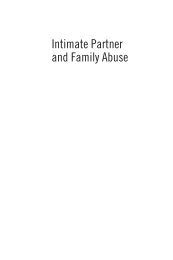Download - Springer Publishing
Download - Springer Publishing
Download - Springer Publishing
You also want an ePaper? Increase the reach of your titles
YUMPU automatically turns print PDFs into web optimized ePapers that Google loves.
xiv • Foreword<br />
learning. Assessment also helps educators to confirm that students have met the<br />
desired outcomes and developed necessary clinical competencies. Evaluation is<br />
the process of making judgments about those outcomes and competencies, based<br />
on the assessment data (Oermann, Yarbrough, Ard, Saewert, & Charasika, 2009;<br />
Oermann & Gaberson, 2014). Nursing faculty members not only assess student<br />
learning and development but also evaluate the program, curriculum, courses,<br />
resources, and other aspects to ensure a high-quality education for students. This<br />
evaluation is done within a quality-improvement framework.<br />
Nurse educators function within institutions and need to understand the<br />
environment in which they teach and its effects on their roles and responsibilities.<br />
The mission and goals of the setting influence the educators’ role. Differences<br />
across schools of nursing in tenure and promotion requirements, criteria for<br />
appointment and advancement in both tenure and nontenure tracks, and expectations<br />
of faculty are striking. To be successful, the teacher needs to understand<br />
those requirements and expectations.<br />
Across all settings, the nurse educator is a leader and change agent, participating<br />
in efforts to improve nursing education, developing educational innovations,<br />
and gaining leadership skills. Once prepared as a nurse educator, one’s own<br />
learning and professional development continue. Educators need to expand their<br />
own knowledge and skills and be committed to participating in career development<br />
activities. As faculty members foster the value of lifelong learning among<br />
students, so too are faculty lifelong learners.<br />
Decisions made about educational practices should be based on sound evidence,<br />
generated through research studies that are of high quality. However, much<br />
of the current research in nursing education is done with small samples, in one<br />
setting, and with questionable tools. We cannot identify best practices in nursing<br />
education without high-quality research studies. However, in some areas of<br />
nursing education, there is evidence to guide teaching, but how many educators<br />
routinely check the literature as a basis for their educational decisions? The role of<br />
nurse educators as scholars not only includes conducting research and disseminating<br />
findings but also approaching their teaching by questioning current practices<br />
and searching for evidence to answer those questions (Oermann, 2009).<br />
Many health fields offer certifications to acknowledge expertise in a specialty<br />
area of practice or role. Similar to certifications in clinical specialties, certification<br />
in nursing education is a means for teachers to demonstrate their knowledge<br />
about nursing education and expertise in the educator role. The National League<br />
for Nursing offers certification in nursing education through its Certified Nurse<br />
Educator (CNE ® ) examination. This examination assesses the teacher’s knowledge<br />
about learning and teaching strategies, learner development and socialization,<br />
assessment and evaluation, curriculum development and evaluation, quality<br />
improvement as a nurse educator, scholarship in nursing education, and the faculty<br />
member’s role within an institutional environment and academic community.<br />
The CNE examination serves as a means of documenting advanced knowledge,<br />
expertise, and competencies in the role of nurse educators.<br />
This book is a valuable resource for nurse educators to prepare themselves to<br />
take and pass the CNE examination and for aspiring teachers of nursing. It includes<br />
valuable information for this purpose and also serves as a review of important<br />
principles for effective teaching in nursing. The book describes the concepts and<br />
principles that define nursing education, describes the core competencies of nurse<br />
educators, and provides the perspective of expert teaching in nursing.<br />
© <strong>Springer</strong> <strong>Publishing</strong> Company, LLC.



